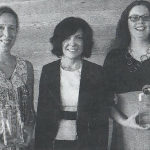One Semester to Launch a Business? SBCC Start-Up Program Accelerates Opportunity
Scheinfeld Center Rapid Launch Intensive program aims to give student entrepreneurs all the tools needed to start their own business
As the business world’s fascination with startups grows, the amount of time it takes to launch an entrepreneurial venture seems to decrease.
Taking the rapid-launch concept to the next level is the Scheinfeld Center for Entrepreneurship & Innovation at Santa Barbara City College. The center’s Rapid Launch Intensive program provides budding entrepreneurs the opportunity to bring a business to life in a single semester.
“It’s truly for students who want to launch their product or service,” Scheinfeld Center director Julie Samson told Noozhawk. “It’s not for the faint of heart.”
The program is open to all SBCC students, with courses on launching an enterprise, business plan development, and production design and rapid prototyping.
Samson said students, most of whom are 18 to 30 years old, can also find internships, networking opportunities, mentoring and post-startup support.
Some 35 students enroll each semester, yielding seven to 12 businesses that launch by the end, Samson added.
Named for the late James Scheinfeld, an SBCC donor and SBCC Foundation member, the center was founded in 2007. The enterprise launch program started up three years later, originally as a campus club.
On April 28, the center will host its annual New Venture Challenge, during which the program’s students and other college enterprises from throughout Santa Barbara County pitch their ideas to investors. The competition also features a high school division.
The winning finalists receive cash prizes and scholarships.
The center was “able to get our feet on the ground,” said Dan Friedman, who launched electronics company FuelBox with business partner Robert Herr after they took the program’s classes several years ago.
FuelBox’s flagship product is its Ultimate Charging Solution, a docking station and mobile battery pack that Friedman said provides more than 25 extra hours of power for virtually any device.
The groundwork he and Herr laid at SBCC, he added, allowed them to bring on UC Santa Barbara engineers to design prototypes, conduct market research, figure out financing and take trips to China to meet manufacturers.
A program mentor from the Small Business Development Center, he said, “actually came to China with us and helped us vet some manufacturers.”
Almost 2,000 products have been shipped since FuelBox went to market in December, he added.
This year, the company plans to expand sales, launch a second product, move into new online and bricks-and-mortar retailers, and donate some of its devices to SBCC.
“We want to give back to the place that started us and where we had our first launch,” Friedman said.
Fashion designer Mary Beth Larkin went through the program last year after losing her original startup in the recession and spending several years with fashion house Giorgio Armani.
“I really didn’t know what I was getting into,” she said of her first venture.
Samson, who was her mentor, introduced her to the Scheinfeld Center, which Larkin said helped her network, refine her business idea and meet investors.
The result was third place in last year’s Scheinfeld New Venture Challenge and a new business, INLARKIN.
Larkin said she hopes to debut her first line of clothing with the startup this fall: a type of leisure and active wear she calls “athglamour.”
“It’s an absolutely amazing program,” she said. “What you put into it, you’re going to get out of it.”
The Scheinfeld Center Rapid Launch Intensive program, however, is not the only startup engine in the area.
The New Venture Competition, put on by UCSB’s Technology Management Program, runs most of an academic year, and focuses on idea generation, mentoring, coursework and public events, where students can present their ideas and business models to panels of professionals.
The Goleta Entrepreneurial Magnet — a partnership between the Goleta Valley Chamber of Commerce, the City of Goleta and UCSB — hosts a summertime accelerator for startups that offers many of the same features.
At San Marcos High School, meanwhile, the school’s Entrepreneurship Academy says it prepares students for the business world “through rigorous coursework, relevant experience in local business community partnerships and student-run business ventures.”
Samson said a key factor behind the popularity of startups is the Internet, which provides many of the tools needed to launch a business as well as the opportunity for an idea to go viral.
The success behind entrepreneurial hubs like Silicon Valley and Boulder, Colo., she added, is due in part to their cultivating a supportive, educational environment with mentorship opportunities.
Small businesses are vital to any community’s economic development, Samson said, making programs like the Scheinfeld Center’s a valuable community asset.


